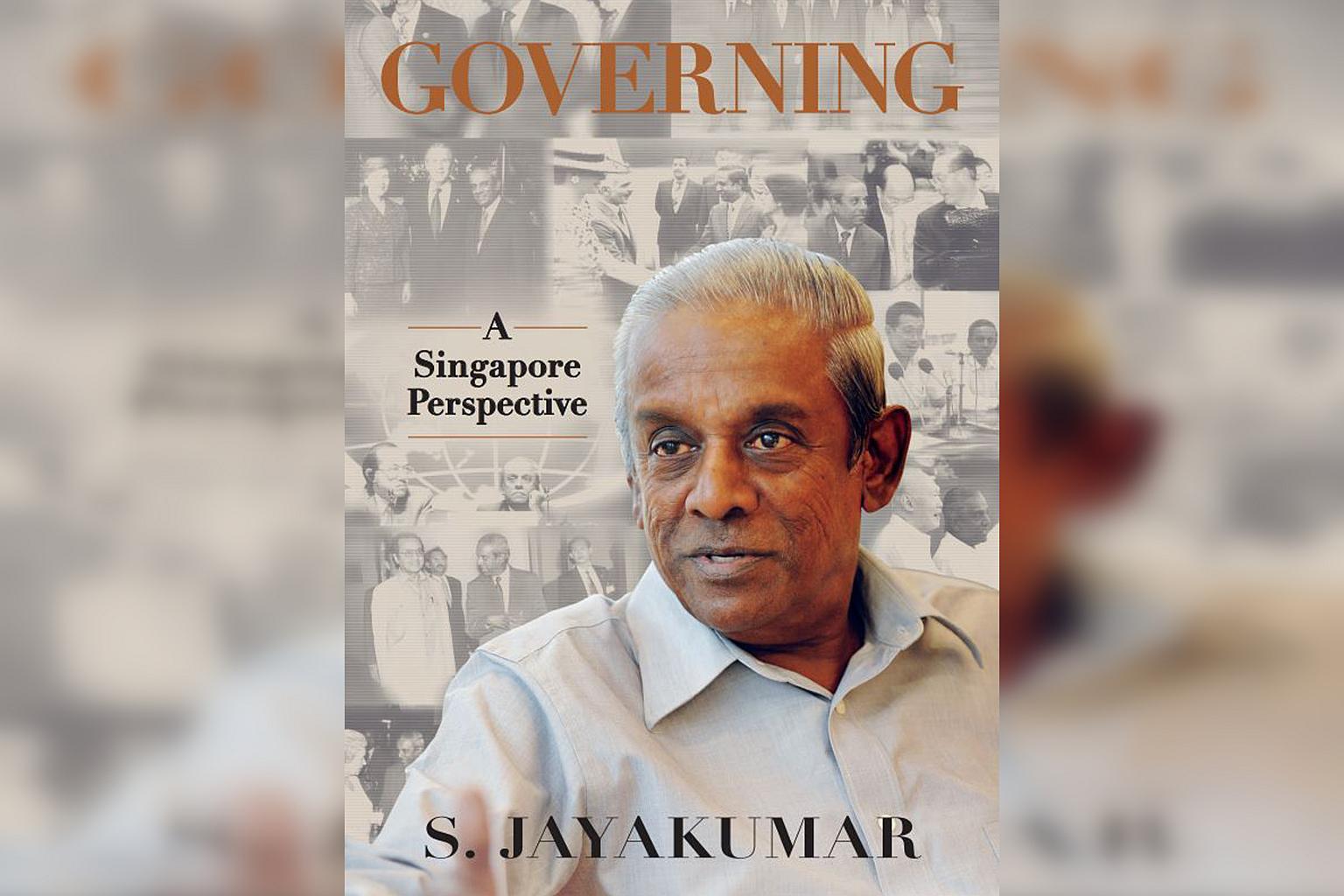Excerpts from Jayakumar's new book, including on Lee Kuan Yew not being 'a panda in the zoo'
Sign up now: Get ST's newsletters delivered to your inbox

Former senior minister S. Jayakumar's new book, Governing: A Singapore Perspective, has insights from his 31 years in politics.
PHOTO: STRAITS TIMES PRESS
Follow topic:
SINGAPORE - Former senior minister S. Jayakumar's new book, Governing: A Singapore Perspective, has a collection of insights from his 31 years in politics. Here are a few interesting excerpts from the book:
1. Reminiscences about founding Prime Minister Lee Kuan Yew
Not a panda in the zoo
Nearly every visitor almost invariably would ask MFA (Ministry of Foreign Affairs) to arrange a call on Mr Lee. This posed a real problem for me and my officials at MFA, because Mr Lee had no patience with visitors who had only platitudes or praises to offer. Time was precious for him. He wanted to meet people from whom he could also benefit through their insights on world issues.
So Mr Lee passed a message to MFA: He was not a panda in the zoo where everybody could go and stare at him. MFA should advise why it was useful for him to see the visitor.
Kitchen Cabinet
The structure and process of Cabinet meetings are not suitable for fast-moving or urgent events and situations that require speedy decisions... Mr Lee Kuan Yew's solution was to constitute a small group of key ministers. This group was initially called the Kitchen Cabinet (KC) and later renamed as the Political Group (PG)...
If the urgency made it necessary, the PM would call for the ministers to meet in a quick huddle... Sometimes, when Parliament was in session, the Prime Minister would convene a PG meeting in Parliament during the tea break.
This practice started by PM Lee has proved useful in effective decision making on urgent matters. Subsequent prime ministers, Goh Chok Tong and Lee Hsien Loong, continued the practice of having the PG mechanism.
A caring side
One day, he turned up at a Cabinet meeting with a plaster on his forehead. I asked him what had happened. Shaking his head, he said he had been careless. The night before, he had been reading to Mrs Lee some of her favourite poems. I understood that he made it a point to read to her every night. (This was after she had suffered a second stroke in May 2008.) That evening, Mr Lee had been very tired and sleepy. As he was reading, he had momentarily dozed off and slumped forward, hit his head on the portable lectern that he used, and suffered a cut to his forehead.
I was very touched. That account has had a special impact on me personally, especially after my wife, Lalitha, developed disabilities as a result of Parkinson's disease (which was diagnosed in 2014).
2. Impressions of world leaders
Sultan Hassanal Bolkiah of Brunei
Both the Sultan and (his brother) Prince Mohamed are true fitness buffs and keen badminton players. Prince Mohamed also practises martial arts. The Sultan asked me to partner him against Wong Kan Seng and Prince Mohamed. I demurred. I tried to wriggle out of the game by saying that I was not fit enough. I said: "Your Majesty, I am 60 years plus and I have not played badminton for some 20 years." He whispered to me: "Don't worry. You just stand close to the net. You take care of Minister Wong; I will take care of my brother!"
I cannot remember which side won, but I was hugely relieved that I survived that ordeal.
Former Malaysian prime minister Mahathir Mohamad
During the drive from the airport to his hotel, he would ask many questions, non-stop. How often are the plants alongside the expressways watered? Which agency does it? What is that new building over there? What is going to be built over there (pointing to a construction site)? How many foreign workers do we have? Sometimes I was stumped and did not have the answer. I had to simply say I would get the information for him later, which I did.
3. On not wanting to enter politics initially
I must confess that I too was nearly guilty of not agreeing to serve. In 1974, when the chairman of PAP, Dr Toh Chin Chye, first broached the idea of my entering politics, I demurred and said that I was not ready.
Later, in 1979, when Goh Chok Tong, through S. Dhanabalan, asked me to stand in the next general election, my first response was that I preferred to continue teaching law at the university.
But they asked me this question: "Supposing you are on the top of our list, and if you say no, and we have to go down the list and everybody else keeps saying no. We then go to the bottom of the list and then later, would you regret it if things went awry in Singapore?
When it was put in that way, I found it very difficult to refuse.

